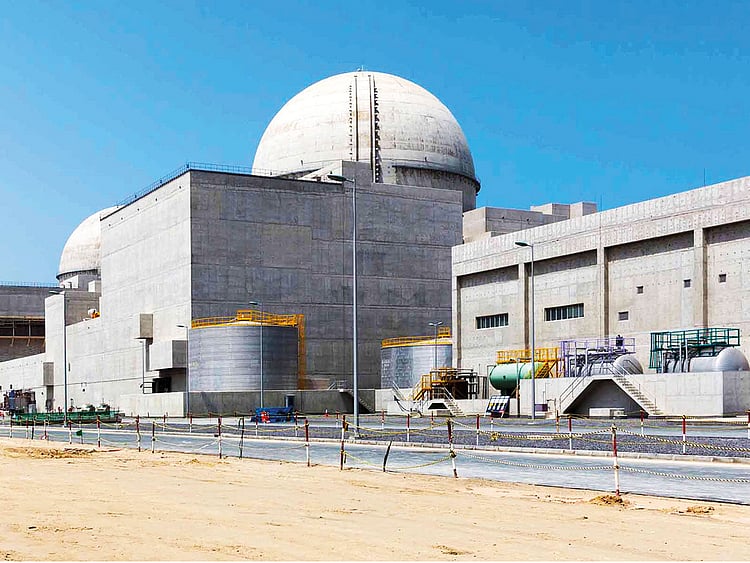Barakah plant delay sets back clean energy target
‘No hike in power tariff for citizens until all rationalisation efforts exhausted’

Abu Dhabi: Delay in planned start-up of Barakah nuclear power plants will set back the UAE’s 2021 target of meeting 27 per cent of energy needs from renewables and “clean energy” sources, Suhail Mohammad Faraj Al Mazroui, Minister of Energy and Industry, told the Federal National Council on Tuesday.
Nuclear power plants are expected to supply 25 per cent of country’s energy needs by 2021.
The first nuclear reactor would come online later this year or early next year, further delaying the launch of the Arab World’s first atomic power station.
Construction of the first of four reactors at the $20 billion (17 billion euro) Barakah plant has been completed ahead of “operation by the end of 2019 (or) early 2020,” Emirates Nuclear Energy Corporation has said.
Afra Al Basti, a member from Dubai, asked why the country fully depends on nuclear and solar power.
Al Mazroui said it was not feasible to produce 5,700 megawatt of solar energy within two years only, when the Energy Ministry knew about the delay in the start-up of Barakah plants.
The minister said within the next five years, five gigawatt of solar energy is planned to be produced.
“However, our 2050 clean energy target of producing 44 gigawatt of solar energy and increasing the contribution of clean energy in the total energy mix from 25 per cent to 50 per cent is on track,” Al Mazroui said.
In 2017, the UAE launched ‘Energy Strategy 2050’, which is considered the first unified energy strategy in the country that is based on supply and demand. The strategy aims to reduce carbon footprint of power generation by 70 per cent, thus saving Dh700 billion by 2050. It also seeks to increase consumption efficiency of individuals and corporates by 40 per cent.
The strategy targets an energy mix that combines renewable, nuclear and clean energy sources to meet the UAE’s economic requirements and environmental goals mainly 44 per cent clean energy, 38 per cent gas, 12 per cent clean coal and 6 per cent nuclear.
The UAE government aims to invest Dh600 billion by 2050 to meet the growing energy demand and ensure a sustainable growth for the country’s economy.
The minister reaffirmed the UAE has been relentless in its pursuit of a greener future, developing solar technologies and deploying them locally and globally.
“UAE is steadfast in its support and deployment of renewable energy solutions and the country-led solar projects have significantly contributed to reducing the cost of opting for solar energy around the world by up to 85 per cent between 2013 and 2018,” Al Mazroui told the House.
Al Mazroui added these efforts have more profound goals to achieve than a mere diversification of the energy sources and preparing for the post-oil era. “The UAE aims along with other GCC members and even Ethiopia after building its dam to export solar energy in the future. The UAE and Saudi Arabia aims to produce more than 240 gigawatts of solar energy,” the minister said.
Members of the House raised the issue of lack of information about percentages of implementation of clean energy.
The minister said there were policies and plans for each emirate, especially in Abu Dhabi, Dubai and Sharjah, but the problem lies in areas of the Federal Water and Electricity Authority, where it is not easy to allocate plots of lands to set up clean energy projects.
“Only recently, a plot of land was allocated for building a clean energy plant in Umm Al Quwain. We have signed a memorandum of understanding to produce 200 megawatts. Without lands, we will not be able to set clean energy plans for the next 10 or 20 years,” the minister said.
Al Mazroui told the House there will be no increase in the electricity tariff for citizens until exhausting all rationalisation awareness efforts. “Fifty per cent of Emiratis are rationale in consumption of electricity. The problem lies in the 20 per cent of citizens who receive 50 per cent of the electricity subsidies,” the minister said.
Sign up for the Daily Briefing
Get the latest news and updates straight to your inbox
Network Links
GN StoreDownload our app
© Al Nisr Publishing LLC 2026. All rights reserved.